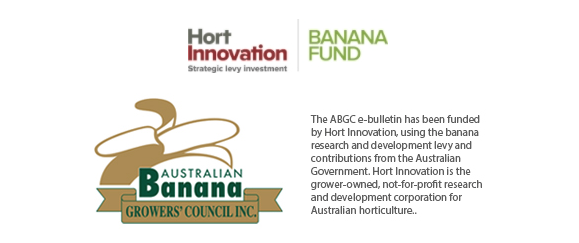The Australian Banana Growers’ Council has been notified by the Northern Territory government that Banana Freckle has now been confirmed on 13 properties in the NT.
Twelve of these premises are located in the Rum Jungle-Batchelor region – where the first detection was confirmed in late May – and includes residential properties and one small commercial grower.
On 8 July, the disease was also confirmed on a single plant at a government-run research facility in the Middle Point area. Additional testing is underway on plants surrounding the initial detected plant at the facility. All banana trees at the site will be destroyed and disposed of on the property.
Landowners of all 13 IPs have been notified that they are not allowed to move plant products, material or equipment from their properties to help stop the spread of the disease.
Additional testing of samples from four further properties at Rum Jungle is underway. Surveillance is continuing to determine the extent of the outbreak, with more than 130 properties examined to date.
So far, all samples collected as a result of tracing and public reports for suspect banana freckle have returned negative results as part of ongoing surveillance.
More than 30 other suspected cases of banana freckle reported by the public have been investigated, with biosecurity officers and testing determining that the incidents are not banana freckle infestations.
A Steering Committee which includes representatives from the ABGC, the NT Government Department of Industry Tourism and Trade (DITT), NT Farmers and Greenlife Australia has been formed and is meeting regularly to respond to this biosecurity threat.
An incident management team (IMT) with DITT was formed in May 2022 to respond to the Banana Freckle threat. The IMT has been working to: contain the infection and prevent further spread; conduct delimitation surveillance surrounding IPs to determine the extent of infection; undertake broader surveillance activities; trace plant materials to limit human assisted transmission; establish movement controls on IPs and surrounding area; raise awareness; and respond to public reports of the disease.
DITT has advised that biosecurity officers have identified the infection early and it can potentially avoid a large-scale program as experienced in the NT in 2013.
DITT will soon be putting a proposed short Response Plan for eradication to affected industries and all Governments for cost sharing approval.
The ABGC will continue to keep growers updated on any new developments as they come to hand.

